CERTIFICATE IN ORGANIZATION DEVELOPMENT
[download pdf copy here]
How can this course help you?
In today’s white water environment of continuous change, only those organizations that are fast and
agile enough to adapt and innovate can survive. For Land D professionals, this course arms you with
the skills to strategically embed training within larger business driven change initiatives. Similarly,
those in HRM will be able to transition from a transactional approach to a strategic business partner.
The Certificate Course in OD prepares you to facilitate and lead the process of transformation.
What are the Learning Objectives?
The OD practitioner adds value to a client organization through the expert application of the
theories and tools of applied behavioural science and other disciplines so that correct choices about
needed changes can be made and executed.
Participants are expected to be able to:
- Discuss the theory and practice of OD
- Enter into a consultant-client contract
- Diagnose organizations and suggest appropriate interventions
- Lead and facilitate appropriate OD intervention activities
- Assess the impact of interventions
Competency-based Learning
Whether you are an external consultant or one who works for an organization and has been given
OD responsibilities, your success will be greatly improved when you are able to practice and master
the core OD competencies. There are altogether 15 competencies which are arranged into five
major competency clusters shown below.
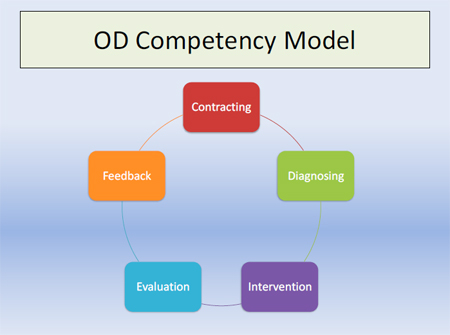
When it comes to OD, no other institute comes close.
SAIDI School of Organization Development (OD) has a definite thrust. Its current VISION is:
“OD Change Leaders faithful to people-centered and experiential approaches, co-mentoring with their clients in understanding and managing change and its requirements.”
The Southeast Asia Interdisciplinary Institute was established in Manila by Sister Jackie Blondin in 1975 to offer graduate and post-graduate programs in Organization Development and Instructional Development. It is a boutique institution in the sense that it specializes in these two disciplines. The degree (MA and PhD) and non-degree OD programs are offered by the SAIDI School of OD. The faculty for these programs consist of full time SAIDI facilitators, supervisors, and mentors as well as resource persons from other academic institutions, government, non-government and private organizations. SAIDI students come from all walks of life and from all over the world.
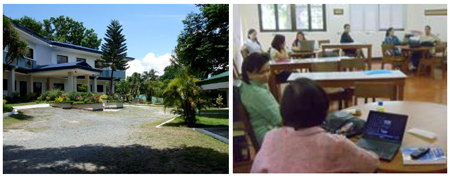
SAIDI is known for its brand of academic programs in Organization Development. Being a degree-granting institution recognized by the Commission on Higher Education (CHED), SAIDI has established its niche in providing quality and learner-centered Master of Arts and Doctor of Philosophy degrees. However, SAIDI has not only established its OD expertise from its distinguished roster of faculty and alumni, but also in its involvements outside the academic field.
Presently, the main SAIDI campus is situated in the hills of Antipolo, away from the noise of Manila. Facilities include workshop rooms, lecture halls, library, living and dining facilities, internet wi-fi, multi-purpose halls, prayer room and quiet places for silence and contemplation.
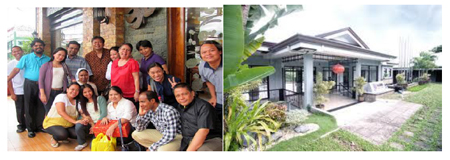
Overview of the COD
The SAIDI COD blends together several learning modules that are delivered through a guided
distance learning format. It combines web-based training technology such as e-learning and virtual
classroom with a 5-days classroom learning experience led by experienced OD experts as facilitators.
The candidates are expected to complete an integrative work-based final assignment that provides
an opportunity to immediately apply new knowledge and skills to their work.
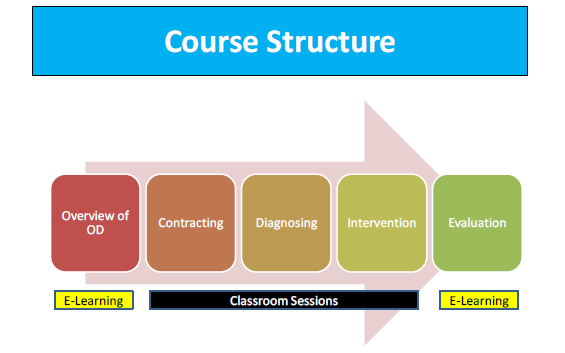
Module One |
Introduction to Organization Development |
| |
E-learning (self-study) with pre-reading assignments |
Learning Objectives. The learner will
be able to: |
- Define organization development
- Distinguish OD from other approaches
- Explain the OD change model
- Do a self-assessment based on the OD
competencies
|
| Outline |
- What is organization development?
- The track record of OD
- Case study No. 1
- What do OD practitioners do?
- The technology of OD
- The politics of OD
- The OD competencies
- A self-assessment on OD competencies
- Making an improvement plan
|
Module Two |
OD Contracting |
| Contact hours |
8 hours ( 1 full day) |
Learning Objectives. The learner will
be able to: |
- Perform rapid context assessment
- Establish a trusting relationship
- Clarify mutual expectations with clients
- Prepare a detailed project proposal
|
| Outline |
- Systems thinking approach to appreciating organizational context
- Do your homework. Immerse yourself in the world of your client.
- Effective rapport-building techniques
- Establishing your credibility
- Rapid situation analysis – asking the right questions
- Gaining agreement on perceived issues
- Proposing the way forward
- Skill exercise simulations on contracting conversations
- Preparing a project proposal
|
Module Three |
OD Diagnosis |
| Contact hours |
16 hours ( 2 full days) |
Learning Objectives. The learner will
be able to: |
- Define what data is needed and how it will be collected
- Select data collection instruments
- Organize and analyse collected data
- Construct a problem-cause hypothesis
|
| Outline |
- A model for analysing performance problems
- Data collection methods
- Building an instrument - workshop
- Testing the instrument
- Conducting interviews and facilitating focus groups
- Skill exercise simulations for facilitating focus groups and interviews
- Recording data
- Organizing and analyzing data
- Problem-cause analysis
- The Gilbert Behavioural Engineering Model
- Developing a problem-cause hypothesis
- Validating root causes
|
Module Four |
OD Intervention |
| Contact hours |
16 hours ( 2 full days) |
Learning Objectives. The learner will
be able to: |
- Match appropriate interventions to root causes
- Prepare an intervention plan
- Organize an implementation team
- Overcome resistance to change
- Facilitate concurrent interventions
- Facilitate the development of new teams
- Take additional actions as emerging situations require
|
| Outline |
- Intervention selection principles
- A template for intervention planning
- Stakeholder management strategies- maintaining support and engagement
- Organizing the implementation team
- Initiating change – building momentum
- Estimating fallout
- Potential problems and how to manage them
- Case study No. 4A
- Building new teams
- Facilitation skills
- Process observation and feedback techniques
- Skill exercise simulations for facilitating team building activities
|
Module Five |
Evaluation and Feedback |
| |
E-learning (self-study) with reading assignments |
Learning Objectives. The learner will
be able to: |
- Develop an evaluation plan
- Select evaluation methods and tools
- Make inferences based on collected data
- Prepare and give feedback reports to stakeholders
|
| Outline |
- What information do stakeholders need to know?
- The hierarchy of summative results
- A template for creating an evaluation plan
- Workshop: Using the template
- Data collection methods
- Defining Key Change Indicators (KCIs)
- Preparing an evaluation report
- Practicing one-to-one feedback
- Skill exercise simulations for one-to-one feedback
- Giving feedback to a group
- Skill exercise simulations for group feedback
|
Assessment
- Full attendance in all class sessions
- Full completion of all e-learning modules
- Completion of coursework assignments
Credentials Earned
The successful candidate receives the Certificate in Organization Development from SAIDI School of OD
An Add-on Advantage: Any candidate who successfully completes this certificate program can receive an equivalent unit credit towards an MA (6 units) or PhD (9 units), as the case may be, in Organization Development. Tuition charges for these units will be assessed at a 15% discounted rate.
Lead Facilitators: Consultants and their Profiles
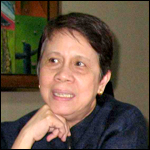 Rosalina O. Fuentes, PhD Rosalina O. Fuentes, PhD
Rose’s background is an interesting mix of disciplines.
Currently, she is the President of SAIDI Foundation, a position she assumed in January 2010, and concurrently the Dean of SAIDI School of OD since 1997.
To date, she has continued educating, training, engaging in consulting and research activities. Most recent of which include her expertise and advocacy of Positive Organization Development and Appreciative Inquiry. Other areas she has extensive experience on include Culture-building, Applied Planning, Re-engineering, and the whole gamut of Organization Development interventions for clients and partners in corporate, non-government, Church, and local government sectors in both local and international settings. Her coaching and mentoring expertise allowed her to journey with more than 100 students in the course of their MA and PhD programs. As an educator, she continues to organize and facilitate teacher-training workshops for basic education teachers across the country, allowing her to travel to different schools and education settings across the country.
Rose earned her Doctor of Philosophy in Organization Development from the Southeast Asia Interdisciplinary Development Institute (SAIDI), her Master of Arts in Education with specialization in Curriculum Development and Instructional Planning from the University of Nueva Caceres, and her Bachelor of Arts and Science in Education major in History from the Ateneo de Naga. She continues to “sharpen the saw” with her post-doctoral certification in Organization Development from Stanford University, trained by David Cooperrider in Appreciative Inquiry at Case Western in Taos, New Mexico,
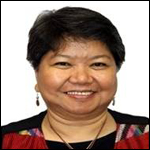 Amor Q. de Torres, PhD Amor Q. de Torres, PhD
Amor is currently the Dean of the College of Education, Principal of the Basic Education, and Education Development and Linkages Director of the Capitol University in Cagayan de Oro City. She was formerly Dean of the Graduate School and College of Education of Xavier University in Cagayan de Oro City for 17 years (1990-2007). Amor is also the Chair of the Technical Panel for Teacher Education of the Commission on Higher Education and is the representative of the Mindanao Teacher Education Institutions to the Teacher Education Council of the Department of Education. Amor counts as her areas of expertise: Teacher Education, Mother tongue based multilingual education, Education for Sustainable Development, Peace Education and Indigenous Peoples Education. She has also been active in working with the Indigenous Peoples and the Muslims for Peace Education for the past 15 years.
Amor completed her Doctor in Philosophy in Organization Development from SAIDI School of Organization Development.
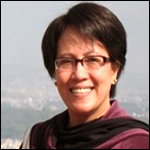 Marie-Paul B. de Luna, PhD Marie-Paul B. de Luna, PhD
Apple/ Ma-Paul is currently Director, Applied Research and Consulting and Registrar for SAIDI School of Organization Development. She also provides close oversight to the Microfinance Management program. Apple/ Ma-Paul was also the former Director for Customized Training Programs for the Ateneo Center for Organization Research and Development (Ateneo CORD).
Prior to her return to the academic setting five years ago, she provided Executive oversight and management and has more than 12 years’ experience in employee and sales management training, training design and facilitation in a multinational corporate setting. To date, she remains passionately attached to the fields of OD consulting for local and multinational organizations, community development for non-government organizations, team and training-trainers facilitation.
She obtained her A.B. Psychology (1991) and Master of Arts in Social and Community (1996) from the Ateneo de Manila University. A year after moving out of corporate, she completed her Master of Science in International Community Economic Development from Southern New Hampshire University (SNHU, New Hampshire, USA). Apple/ Ma-Paul also completed a Professional Certificate in Organization Development from Stanford University (Palo Alto, California). She also completed her PhD in Organization Development at the Southeast Asia Institute for Interdisciplinary Studies (SAIDI, Philippines).
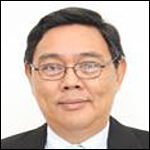 Mario A. del Castillo, PhD Mario A. del Castillo, PhD
Mario brings with him over 30 years of working experience in the arena of education, management, leadership, marketing, training and human resource development in corporate settings. He has consulted for both local as well as multinational and government organizations in the areas of strategic planning, performance consulting and HR Development and Management. He is also a course designer for the Certified Training Professional offered by ITDWorld and has developed the ARTDO-ITD Competencies Model for professional trainers. He has been recognized as an HRD mentor to hundreds of L and D professionals and has played an important role in contributing towards the development and growth of HR and OD in this part of the world. He is also resource person for the Certified Talent and
Competency Program which he co-facilitates with Prof. William J. Rothwell. He was past president of PSTD and ARTDO.
His current interests and field of consulting also includes Instructional Design and Course Development. He has developed numerous courses including the Certificate in Courseware Development that he conducts. He has made numerous presentations at international HR conferences and his papers were published by the conference organizers in Australia, USA, India, Taiwan, Middle East, Thailand, Indonesia, and Manila Mario is an accredited international consultant for the United Nations in the field of Training and OD. His BSc and MBA are from the Ateneo de Manila University. His PhD in Organizational Development is from the South East Asian Interdisciplinary Institute School of OD, Manila.
Program Investment
Php 78,000/ participant, RM 5,800/ US 1,950 participant (PSTD and PMAP members receive 5% discount!)
includes Program Fees, E-learning Sessions and Web Tutorials, Materials and Main Reference Book, Full Bed and Board for 5 days and 4 nights
Registration is from 03 November to 29 December 2013. Participants may start with their first e-learning lessons anytime beginning 02 January 2014. Live classroom sessions at SAIDI, Antipolo are from 04-08 February 2014. You are requested to reside on campus for the duration.
Inquiries may be directed to Marie-Paul B de Luna. Her email is mpbdeluna@saidi.edu.ph or you may call 632-6589302. |
|
